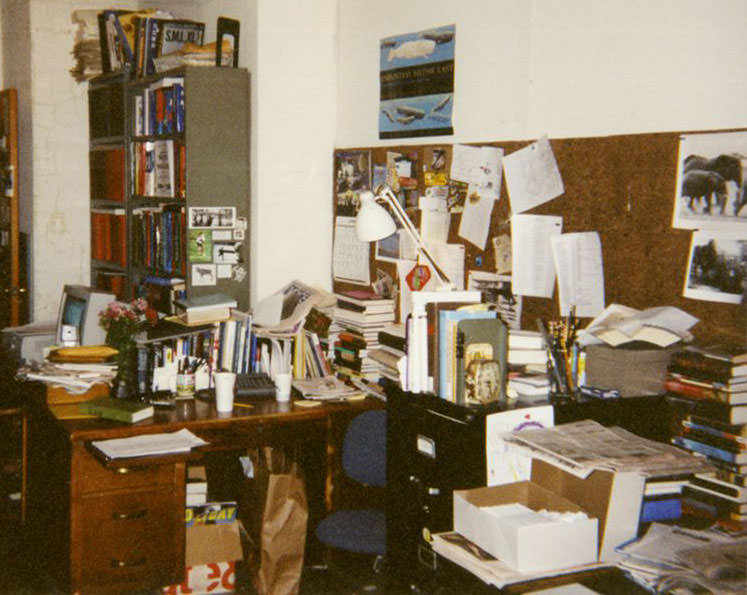This is one in a series of reminiscences by staff members of The New York Review of Books about their time working at the magazine.
When I think of the focused efforts that led nowhere, and the gifts that have fallen in my lap—like working at the Review—I have to resist discerning a pattern. I was sleeping on a friend’s floor in New Orleans, running from a heavy heart, when Barbara Epstein offered me a job as assistant editor (I had recently left the book clubs the Review owned). It was the spring of 1989; I was twenty-four. Sensibly, reluctantly, I returned to New York and plunged into the work: reports on a Beijing Spring, followed so quickly by Tiananmen Square. People my age and younger were expressing their hopes, their despair—and being killed by young and desperate soldiers. That autumn, statues of square-jawed leaders in overcoats were pulled down from village squares in Central Europe; a Soviet tank was painted pink. Timothy Garton Ash wrote 10,000-word pieces from the front lines of what appeared to be a peaceful revolution spreading across the empire. Every other week I pored through hundreds of photographs, Kerry Fried and I making the first selections. We read aloud to each other passages from Joan Didion’s article on the Reagan White House. The Ceaușescus were executed. As I watched the crumbling of state socialism, fact-checked (with horror) articles on the US-backed wars in Central America, an inchoate sense of history soothed the ache of my lover having taken up with my best friend.
Working at the magazine led me to Prague, to see for myself what political change means to people who had been raised on revolution. Conquest, collaboration, survival in a violent world, the limits of language: all of these were themes introduced to me through the pages and the people of the Review, ending with Ari Shavit’s extraordinary essay on his military service in Israel, as a guard at a Palestinian prison camp (“On Gaza Beach,” July 18, 1991), which I read with hundreds of students in Prague (they loved it, too), and which returns to my mind sometimes in a rural Massachusetts jail, where I now teach a class in sociology.
Other random memories: David Levine telling me he wanted to be remembered not for his caricatures but for his paintings of Coney Island. (Sophocles wanted to be remembered for his valiance as a soldier.) The brilliant sunsets on 57th Street; the lavish lunches during press week when we worked twelve-hour days; Barbara ordered whole red peppers and ate them like apples. We referred to Bob and Barbara as Oberon and Titania; we were the rude mechanicals. We waited anxiously—the clock was ticking—while they argued in Barbara’s office about the order of the issue: Bob would then race into our office with a scrawled list, excitedly, momentously, as though they had discovered a new constellation. The paper was still being laid out by hand: I made a dummy of each issue with Xeroxes of columns of type taped together into rolls.
The television was on in Neil Gordon’s office on January 17, 1991, the night of the US aerial bombing of Baghdad; it was a press night, we were exhausted, transfixed by the horror of the “surgical strike” replayed over and over, like a surreal eschatological game on CNN, with Bob rushing in every ten or fifteen minutes saying, Jesus Christ (or bloody hell), and rushing out again.
From reading Bob’s additions to a manuscript or set of galleys I learned the importance of establishing with perfect economy the historical and statistical setting of a piece of reportage. His passion for animal rights introduced me to Peter Singer. From Barbara I learned how to cut the excess words to reveal a writer’s true sound. I loved her knowledge of art, her skirts above the knee—she was in her mid-sixties—her perfect ear.
There were a few women in the pages of the magazine—we celebrated when an article came in by Elizabeth Hardwick, Hilary Mantel, Joan Didion, Jeri Laber, or Elena Bonner—and many wonderful women working at the magazine, in addition to those who put it together, sold the ads, answered the phones: particularly Kerry Fried, who had read every novel, great or obscure; Janet Noble, cover designer, playwright, and unwitting mentor; Ann Kjellberg, still a source of inspiration to me; and Brina Gehry, dancer, choreographer, and typesetter.
On my last day at the office Barbara disappeared and returned with a purple waterproof Walkman—a gift for her friend in Prague, the editor Jan Zelenka. That gesture still touches me. Jan’s tales of publishing American writers in translation at the almost defunct state publishing house, of navigating the spies and interrogators—and the competition that literature faced from diet and bonsai books and CDs and Western magazines—transfixed me. Within a month I was helping to launch Prague’s first English-language weekly newspaper, using all the skills I hadn’t realized I’d accumulated during my apprenticeship at the Review.
Advertisement
Revan Schendler was an assistant editor at the Review from 1989 to 1991. Two of her poems have appeared in its pages. She lives, writes, and teaches in western Massachusetts.



